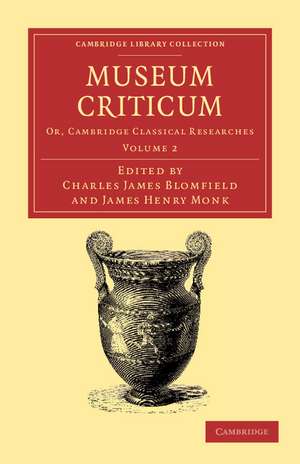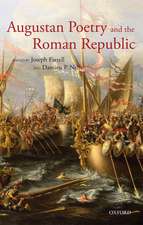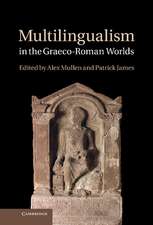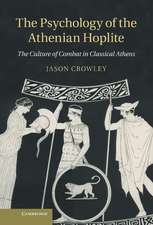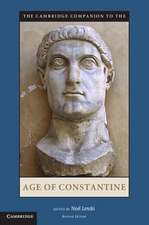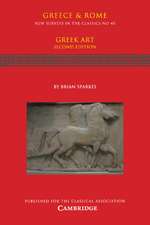Museum criticum: Or, Cambridge Classical Researches: Cambridge Library Collection - Classic Journals
Editat de Charles James Blomfield, James Henry Monken Limba Engleză Paperback – 14 noi 2012
| Toate formatele și edițiile | Preț | Express |
|---|---|---|
| Paperback (2) | 453.78 lei 43-57 zile | |
| Cambridge University Press – 14 noi 2012 | 453.78 lei 43-57 zile | |
| Cambridge University Press – 14 noi 2012 | 530.06 lei 43-57 zile |
Preț: 530.06 lei
Nou
Puncte Express: 795
Preț estimativ în valută:
101.52€ • 104.59$ • 85.04£
101.52€ • 104.59$ • 85.04£
Carte tipărită la comandă
Livrare economică 24 februarie-10 martie
Preluare comenzi: 021 569.72.76
Specificații
ISBN-13: 9781108056595
ISBN-10: 1108056598
Pagini: 720
Ilustrații: 2 b/w illus.
Dimensiuni: 40 x 216 x 140 mm
Greutate: 0.9 kg
Editura: Cambridge University Press
Colecția Cambridge University Press
Seria Cambridge Library Collection - Classic Journals
Locul publicării:Cambridge, United Kingdom
ISBN-10: 1108056598
Pagini: 720
Ilustrații: 2 b/w illus.
Dimensiuni: 40 x 216 x 140 mm
Greutate: 0.9 kg
Editura: Cambridge University Press
Colecția Cambridge University Press
Seria Cambridge Library Collection - Classic Journals
Locul publicării:Cambridge, United Kingdom
Cuprins
Part V: Annotation in Euripidis Medeam; Josephi Justi Scaligeri epistolae quaedam selectae; Immortalitas animae, carmen hexametrum; Carmen antistrophicum ex Aeschyli Prometheo; Statement of some opinions respecting the Greek accent; On the dramatic representations of the Greeks; On certain early Greek historians mentioned by Dionysius of Halicarnassus (cont.); Porson's review of Brunck's Aristophanes; On the usage of the word 'pharsos'; Ricardi Bentleii emendationes in Aristophanem hactenus ineditae; Review of new classical publications; Part VI: Extracts of letters and papers relating to the Egyptian inscription of Rosetta; On the dramatic representations of the Greeks (cont.); Josephi Justi Scaligeri epistolae quaedam selectae; Cartesii Principia, carmen hexametrum; Platonis Principia, carmen hexametrum; Newtoni Systema mundanum, carmen hexametrum; On the language of the Pelasgi; On the Ionic dialect; Illustration of a passage of Callixenus respecting Egyptian architecture; Remarks on the ninth book of the Iliad; Stesichori fragmenta; Annotatio in Euripidis Iphigeniam Tauricam; Review of new classical publications; Part VII: Letters relating to the inscription of Rosetta; Sophronis fragmenta; Alexandri, medici Graeci, anecdoton; Inscription Deliaca; The Chalybes of Xenophon; The caryatides of ancient architecture; Bentleii epistolae; Aeschyli Agamemnonis codex MS Neapolitanus; On the dramatic representations of the Greeks (cont.); Supposed plagiarisms; E. H. Barker, O.T.N.; Statements of Professor Playfair respecting the University of Cambridge; Memoir of the Rev. Edward Valentine Blomfield, M.A.; Literary intelligence; Part VIII: Letters of Bentley and Bernard; Sophronis Syracusani fragmenta; Greek inscriptions copied in Boeotia; Emendationes in Anthologiam Graecam; Animadversiones in Sapphonis et Alcaei fragmenta; Augusti Boeckhii prolusiones; On the cursive Greek character; Review of Elmsley's and Hermann's editions of The Bacchae; Memoir of Dr James Duport; Index auctorum emendatorum in tom. II.
Descriere
This early classical journal, collected in two volumes in 1826, illuminates the development of academic journals and classical scholarship.
